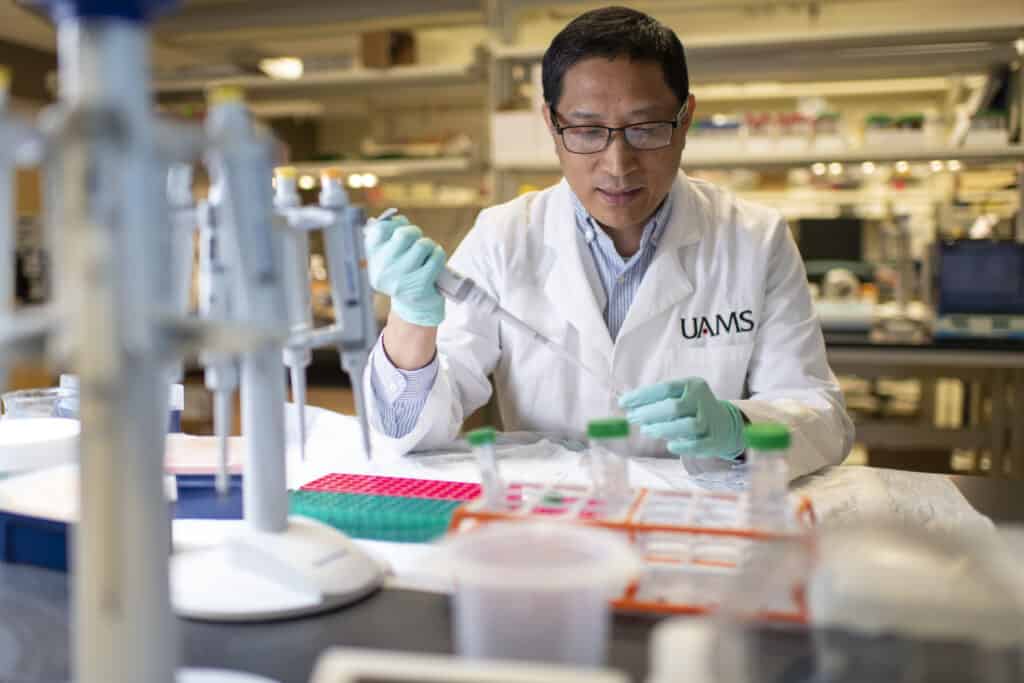Fenghuang (Frank) Zhan, M.D., Ph.D. Moves Myeloma Research forward with Grant Funding

Since Fenghuang (Frank) Zhan, M.D., Ph.D., returned to the Myeloma Center as the research director, the number of researchers working in the center’s labs has increased as has their understanding of types of myeloma that are especially difficult to treat.
“We are excited to have Dr. Zhan back in our fold,” said Frits van Rhee, M.D., Ph.D., clinical director of the Myeloma Center. “He brings with him great expertise regarding the molecular genetics and biology of myeloma, as well as drug resistance to therapy.”
Zhan, who is an endowed chair and also serves as a professor in the UAMS College of Medicine’s Department of Internal Medicine, was previously at the UAMS Myeloma Center from 2002 to 2008, as an assistant professor.
The native of China was most recently a professor of medicine at the University of Iowa and an adjunct professor with the University of Iowa’s College of Dentistry and Dental Clinics.
After leaving UAMS in 2008, he joined the Utah Blood and Marrow Transplant and Myeloma Program at the University of Utah’s Huntsman Cancer Institute and later worked at the Holden Comprehensive Cancer Center at the University of Iowa Health Care in Iowa City, Iowa.
Zhan brought with him additional funding in numerous grants. In 2020, Zhan received two National Institute of Health and U.S. Department of Defense grants totaling almost $3.14 million to study the molecular genetics and drug resistance of multiple myeloma. He is also a recent recipient of the Riney Foundation grant of $1.8 million.
Zhan’s grant from the U.S. Department of Defense (DOD) provides $1.3 million, and the other comes from the National Institutes of Health (NIH) for nearly $1.74 million. Both projects aim to better understand the biological processes behind myeloma in order to search for new treatments and cures. The DOD grant runs through 2023 and the NIH grant continues through 2025.
“Once the biology of myeloma stem cells is better understood, more novel therapeutic targets can be created and tested, with the ultimate goal being to develop a novel therapy and prevent myeloma relapses,” said Zhan.
His lab is using the DOD grant to study the biology of specific myeloma cancer cells that can survive chemotherapy, working to find a potential cure to eradicate these cells.
The theoretical treatment is two-fold — a tandem stem cell transplant accompanied by chemotherapy, followed by a particular type of immunotherapy aimed at killing the remaining drug-resistant cells.
These drug-resistant cells often cause relapses of myeloma and other types of cancers. Zhan believes the protein, CD24, may serve as a reliable indicator of the presence of these drug-resistant cells and that the therapeutic antibody, SWA11, may be used to target them.
“We are working to develop a specific CAR T-cell therapy for this population of patients,” Zhan said, adding that the research is still in early stages.
The NIH-funded study focuses on the NEK2 and PD-L1 genes, striving to uncover how they work and how they possibly fuel myeloma. The disease of patients who have these genes is difficult to cure and the patients are at high risk for relapse.
Therapies targeting PD-L1 have been successful in treating many cancers, but attempts to demonstrate their effectiveness for myeloma have not met with the same success. Zhan believes this is probably because this gene is most common in patients who have a subtype of myeloma called hyperdiploid and PD-L1 studies have not targeted these patients.
As for other subtypes of myeloma where PD-L1 levels are low, such as in high-risk and relapsed myelomas, Zhan believes that a combination of a NEK2 treatment and PD-1/PD-L1 treatment could be effective.
Zhan’s lab of more than a dozen members, including four faculty members, six post-doctorates, two senior scientists, one M.D. student and one graduate student, are working to test these theories at the molecular level using a couple of different methods.
“We have made a lot of progress in this study,” Zhan said of the study that focuses on patients with high-risk myeloma with cancer cells that are drug resistant. “We have made some major advancements and increased immune response.”
“Chemotherapies, stem cell transplants and immunotherapies don’t work with them so we need to reduce the number of NEK2 genes and increase the PD-L1 levels.”
Part of the Riney grant is being used to help develop a new drug, the PROTEC-NEK2 inhibitor. The goal of that research is to use new technology to develop a more effective targeted therapy attacking tumor cells while preserving the normal cells.
“Each group of myeloma is different and we’re trying to identify different molecular targets of each of the groups and develop a new antibody to target those proteins or genes.”
The Myeloma Center’s patient database containing over 24,000 samples with attendant microarray and clinical data from healthy donors, and patients with Plasma Cell Dyscrasia greatly assists in the Myeloma Center researchers’ work.
“Our database is unique, and no one has this huge of a database,” Zhan said. “Within it, we find these markers and are able to move forward to develop this therapy.”
He believes the results of the studies could reach far beyond myeloma to assist in treating many other solid tumor and blood-related cancers.
“Dr. Zhan’s ability to identify and target myeloma stem cells and the genomic classification of the disease is an immense asset to UAMS,” van Rhee said. “He is greatly helping us to further the innovative treatment we have offered for more than 30 years now.”
